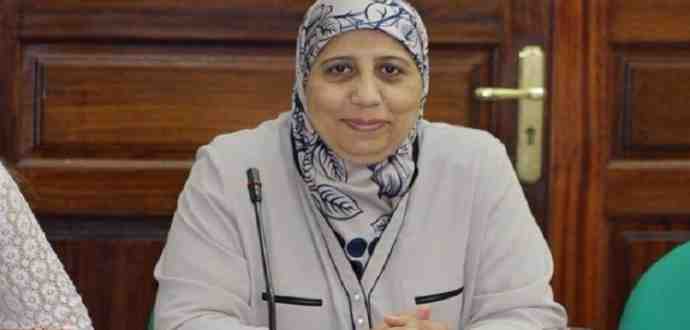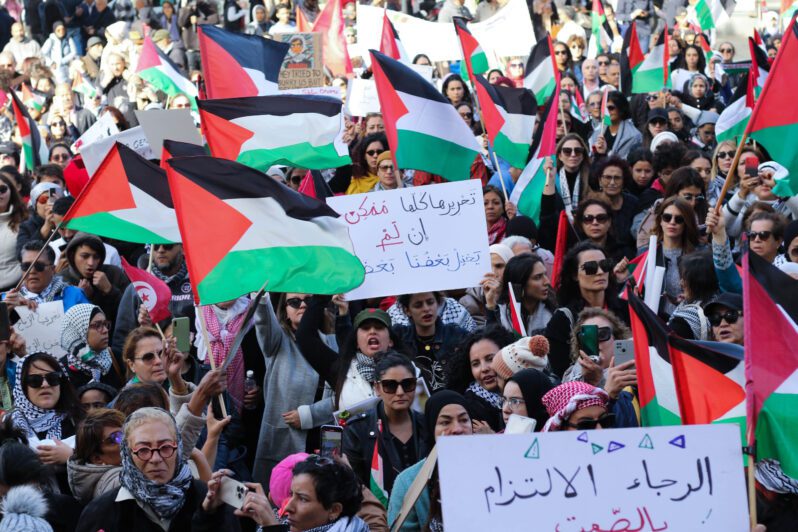Zoghlami: TDC Success is Incomplete

Editor’s note: Tunisia's transitional justice law stipulates that the Truth and Dignity Commission (TDC) be the institution that plays a driving role in pushing for justice along different tracks. It also sets the four-year term of this body, calculated as of the date of appointment of its members (which took place in May 2014), with a one-year extension. In light of deep disagreements between the TDC and the Tunisian government, the former unilaterally decided to extend its mandate until the end of 2018. This year, hundreds of judicial files have been referred to the Specialized Transitional Justice Chambers established under the same law. These chambers are in charge of looking into the files as per the applicable criminal principles. For the purpose of assessing the work of the TDC, we spoke to MP Yamina Zoghlami who has contributed to laying the legal foundations of the process of transitional justice in Tunisia and played a major role in seeing it through. After heading the Committee of Martyrs and Wounded of the Revolution during the term of office of the National Constituent Assembly, she is now an active member of Tunisian Parliament and the main person in charge of the portfolio of transitional justice file within the Ennahda Movement.
The Legal Agenda: During its 24th term, Ennahda’s Shura Council stated that the TDC work results “had not met expectations in terms of disclosing the truth, reparation, and rehabilitation, so as to achieve comprehensive national reconciliation”. In its 25th session statement, the Shura Council later praised the role of the TDC and called for “completion of the transitional justice process as required by law”. In light of such fluctuating Ennahda discourse, how can we understand its position on the TDC?
Zoghlami: Regardless of all these statements, Ennahda’s position cannot be clear-cut until after reading the final report of the TDC. So long as this report –which contains the part on disclosing the truth, and the violations and recommendations – has not been published, Ennahda’s position will continue to fluctuate. We also should not forget the great pressure exerted on Ennahda today by a large number of victims; hence the indecisiveness. The victims who protested and carried out sit-ins at the TDC gate to demand reparations and rehabilitation are now protesting in front of Ennahda’s headquarters in Montplaisir (Tunis). There are also other victims who are not interested in reparation, but in truth disclosure, and demand comprehensive national reconciliation.
However, about 70% of the victims were previously affiliated with The Movement of Islamic Tendency; later named Ennahda. Most of them have no social or health coverage, but have held great hope on transitional justice to improve their situation. They also hoped it would rebuild a relationship of trust for them, their children, and families with the Tunisian state after years of injustice and oppression under the reign of Bourguiba and Ben Ali.
Thus, Ennahda is under great pressure today, especially since the victims still haven’t received anything yet, whether rehabilitation or even an apology by the state for the violations. In addition, we should not forget the systematic campaigns aimed at tarnishing the image of the victims who were sometimes described as terrorists, Islamists, and other times as confiscators of the country's wealth and beneficiaries of the general amnesty. We have witnessed these campaigns recently during the discussions on the 2019 budget. The subjects of Karama Fund and the transitional justice course were brought into these discussions.
The Legal Agenda: In the same context, we notice that Ennahda has recently called on the “completion of the process of transitional justice, as stipulated by its law”, after the movement said that its parliamentary bloc intends to submit a new draft law on comprehensive reconciliation. Have you backtracked on this project?
Zoghlami: Ennahda’s goal, as stipulated in the regulations of its 9th and 10th conferences, is to achieve comprehensive national reconciliation in order to avoid a repeat [of what happened]. In 2014, we voted for a constitution that enshrines freedoms, rights and coexistence. Despite attempts to disrupt the transitional justice process and the work of the TDC, Ennahda sought to benefit from the work of the TDC to develop a system of comprehensive reconciliation that would follow the stages of disclosing the truth, rehabilitation, and accountability. There is an equation Ennahda seeks to achieve, and that is to safeguard the rights of all the victims without any exception and provide redress, but at the same time seek to assess the TDC output and its work course in a serious and objective manner.
The fact of the matter is that the TDC did not succeed in all areas entrusted to it. It did succeed in holding public sessions that disclosed the level of violations practiced by the previous regimes to Tunisians and the world. It also succeeded in receiving the victims’ files. However, it failed to handle these files in a clear fashion. Most of the files were referred to the Specialized Judicial Chambers without investigation and fact-finding. The TDC work was also missing the principle and mechanisms of reconciliation. Had the TDC tried to include this concept, its meanings, and mechanisms in its work, many critics who rejected the specialized chambers would have accepted the transitional justice course. The mechanisms of the reform of public institutions were also absent.
Today, a lot of questions are being raised. First, why does the TDC publish decisions on individual reparation on its official website gradually and in a piecemeal manner? I have learned from one of the employees at the TDC that files are still under investigation and fact-finding although the TDC has already completed its term of office. We therefore request the TDC and its chairperson to clarify this matter. Additionally, are these drawdown works or not? If so, then under the law, the TDC may not carry out investigations during the drawdown period. Also, when will the TDC’s term of office expire?
As an official institution with its own budget and independence, the TDC had a great opportunity to introduce the concept of transitional justice to Tunisians, if only it accepted cooperation with civil society and used its official website and social networks to create communication frameworks with citizens, even under state and media criticism.
As a result, transitional justice has yielded nothing so far in Tunisia except a few public hearings and a reparation piece of paper some victims were able to obtain. Tunisia did not take any step to turn the page of the past, overcome abuses and [heal] wounds. Ennahda seeks to do so through comprehensive reconciliation.
The Legal Agenda: In 2013, the National Constituent Assembly's consideration of the transitional justice draft law coincided with its work on the drafting of the 2014 Constitution. However, although this Constitution explicitly stated the two-tier litigation principle in all trials as per international standards of fair trial, such principle was missing from the Transitional Justice Law. How do you explain this?
Zoghlami: I was a member of the Constituent Assembly back then and I remember asking this question to Samir Dilou and all Technical Committee members when this law was still in the drafting process. I also objected to the long term of office set for the TDC. Additionally, I had great doubts about the possibility of including the two amnesty decrees in this law. Unfortunately, the questions I had raised were overlooked in light of the conflicts and crises we were going through in that period, and I could not get answers. The law was passed afterwards.
The two-tier litigation issue is now firmly raised by Ennahda within the framework of its comprehensive reconciliation project that we have already talked about. We believe that a legislative initiative is needed to ensure the continuation of the work of the Specialized Judicial Chambers to preserve the rights of the victims and reach comprehensive reconciliation in Tunisia.
I am in charge of this file within Ennahda whose chairman, Rachid Ghannouchi, asked this question several times in front of me: “How did Ennahda ratify a law that does not guarantee the right to two-tier litigation?” Ghannouchi considers this to be very damaging to the essence of justice. There are some who believe that transitional justice is exceptional justice and should have exceptional measures. To those I say that in the 2014 Constitution we removed everything that is exceptional, such as military courts. Today, the Ministry of Defense and the military judiciary should work on a new law that regulates the military judiciary, as it is not exceptional under the Constitution.
The TDC’s referral of files to the specialized chambers without fact-finding and investigation has strongly raised the issue of the absence of the two-tier litigation principle.
The Legal Agenda: In a statement you’ve made recently, you expressed real concerns about the fate of the victims’ archive. What caused these fears?
Zoghlami: The chairperson of the TDC has recently announced that she will hand over the archive to the National Archives of Tunisia. However, she still hasn’t submitted it, whether in hard-copy or electronic form. This is really surprising. Does the TDC consider itself above the law? This shows not only disrespect for the law but for the victims and transitional justice. Also, who is monitoring the TDC now under the drawdown? And how can we guarantee that it will hand over the archive untampered with? I’m not saying there is bad intention here, but keeping the archive at the TDC confirms that there is still ongoing works of investigation and fact-finding because there should be an archive for these works to be carried out. This is a violation of the Transitional Justice Law.
After the TDC chairperson submitted the report to the president then to parliament, the prime minister assigned the minister of human rights to enter into a written agreement with the TDC that stipulates how to receive and deliver the archive and equipment. The final report was then accepted by the president and published.
The Legal Agenda: How do you assess the transitional justice process? And what would ensure the rights of victims in your opinion?
Zoghlami: The transitional justice path is not represented by Sihem Ben Sedrine, the TDC, Samir Dilou, the Ministry of Human Rights, or any figures or institutions. This path belongs to Tunisia and all Tunisians. Tunisia’s revolution is peaceful and the victims of tyranny want transitional justice, despite the abuse they suffered. These victims want to turn the page on the past, so this path must be completed.
In my opinion, the most important thing that can be achieved is the involvement of the perpetrator in the transitional justice process and its mechanisms, and in the reform of public institutions. This issue was absent from the work of the TDC. I hope the transitional justice file will become a comprehensive human rights file in which martyrs and victims will be honored. In reality, however, the success of this path remains dependant on the next political class and the 2019 elections. Will the elected political class be with or against the transitional justice process?
In both cases, I rely on human rights organizations and associations in Tunisia to pressure the governing system to complete this path. I also wish they would put aside their ideological differences. Serving justice for the victims is a clear and solid human rights issue regardless of ideological or political affiliations.
This interview is an edited translation from Arabic.
Keywords: Truth and Dignity Commission, Transitional Justice, Yamina Zoghlami, Ennahda



